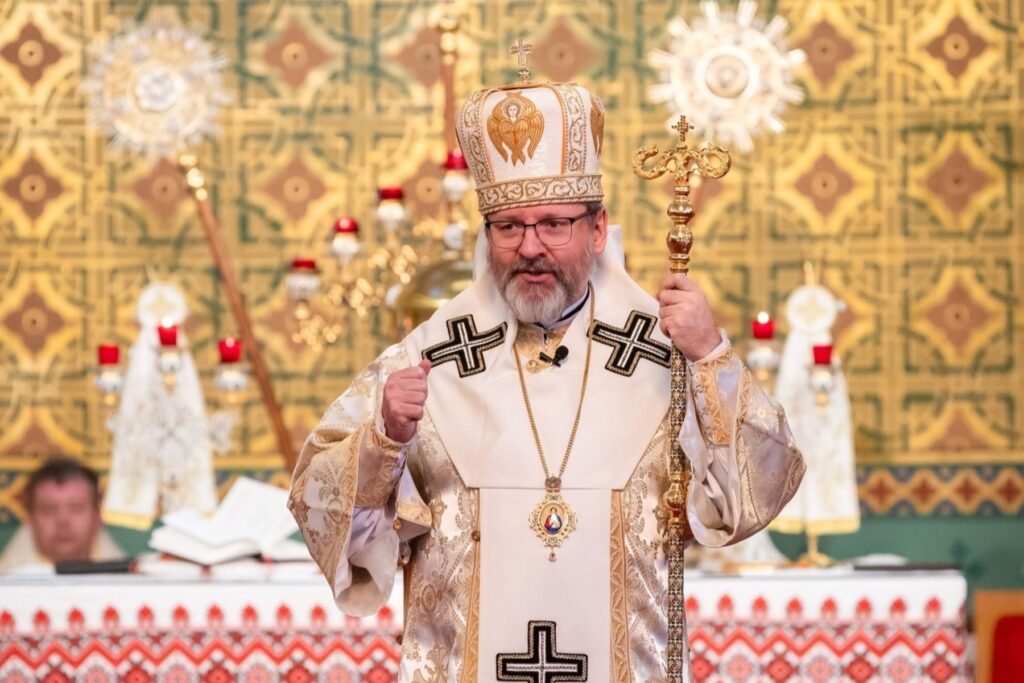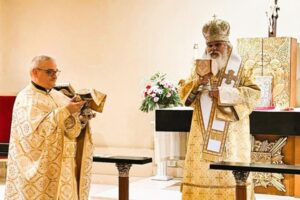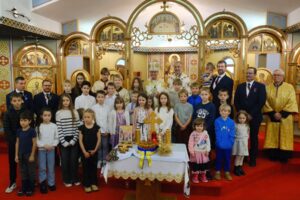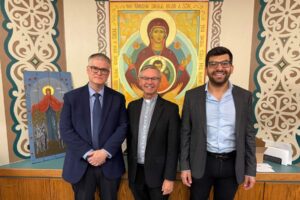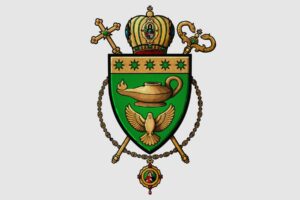In his sermon on Cheesefare Sunday, March 2, 2025, His Beatitude Sviatoslav, Father and Head of the Ukrainian Catholic Church, reflects on the meaning of Great Lent in the context of the current trials that Ukraine is experiencing. He emphasizes the importance of hope, strength of spirit, and trust in God even in the most difficult times. The Patriarch explains the true purpose of fasting, emphasizing the need not only for external restrictions, but also for internal renewal through love, mercy, and forgiveness. He calls for maintaining a cold mind, a hot heart, and a steely will to overcome difficulties and come closer to the true spiritual treasure—union with God.
The main points of His Beatitude Sviatoslav’s homily are:
- Why the existence of Ukraine and its struggle is an act of God
- The three important things to do before the start of Great Lent
- The true meaning of fasting and what it means to “lay up treasure in heaven”
- Why forgiveness is an important element of the Lenten journey and how it helps a person to be free
- The role of a cold mind, a hot heart, and a steely will in the life of a Christian
- The significance of Lent in the context of the current situation in Ukraine and how it can help in the fight for victory
“For where your treasure is, there your heart will be also” (Matthew 6:21)
Your Excellencies!
Venerable and Revered Fathers!
Our dear youth!
Our dear SUM, PLAST and Knights of Columbus!
Dear brothers and sisters in Christ! Our esteemed Winnipeg community!
Glory be to Jesus Christ!
The Power of God’s Miracle
I have a feeling of a strange and great miracle — I can be with you today. Three years ago, some gave us only three days, and we could not have made it, because our names were put on the kill lists. However, three weeks have passed — and here we are. Three months have passed — and here we are. Three years have passed — and Ukraine stands, fights, and prays! This act of God is revealed in the body of the wounded but adamant Ukrainian people. The people of Ukraine are tired, wounded, but steadfast and strong.
I have come to you not to complain once again, but to testify to the power of hope from Ukraine and for Ukraine. This power of ours does not come from human efforts, but from the great power of God, which, according to the words of the Apostle Paul, is often manifested even in our weakness (cf. II Cor. 12:9). God’s power is the foundation, content, and support of Ukraine’s hope.
The Church is by Your Side in Times of Trial
We have a truly historic opportunity to be together! I have come to you to conclude the proceedings of the Permanent Synod of Bishops of the Ukrainian Catholic Church, which was held this week in Toronto. Today, the bishops are celebrating the Divine Liturgy in various parishes, mainly around the city of Toronto. I have come to Winnipeg to support Metropolitan Lawrence Huculak, who is recovering from COVID. Yesterday, I also visited Bishop Peter Stasiuk in the hospital and had the great privilege of administering the Holy Sacraments to him.
With this gathering in prayer today, we begin the journey of Great Lent. This Sunday is called Cheesefare; it reminds us of Adam’s expulsion from Paradise. Tomorrow is the first day of the forty-day journey to the glorious feast of Christ’s Resurrection. This is a time of renewal of Christian life. The Fathers of the Church call Great Lent a spiritual spring. Although it is still cold in Manitoba, it will soon get warmer. I am told that spring is already beginning to arrive in Ukraine.
How to Avoid Getting Lost During Lent
In setting out on a journey, each of you must do three things: first, determine the destination (goal) you are heading for; second, choose the correct route so as not to get lost; third, find the necessary means and tools for the journey. Otherwise, the journey, even across the vast prairies of Manitoba, will be unsuccessful.
The word of God, i.e. the Holy Gospel, also speaks today about three important things that are necessary in order to enter the time of Lent, and which are not always easy to perceive and understand. First of all, it reminds us that the purpose of Christian fasting is not dietary restrictions or rituals. Fasting is not an end in itself, but a means. The true goal is our treasure in heaven. That is why this Gospel ends with the words: “Where your treasure is, there your heart will be also” (Matthew 6:21).
In the Holy Scriptures, the word “heaven” is often used to refer to God. After all, in the Old Testament, the name of the Lord could not be pronounced lightly. To be rich in God, to acquire treasure in heaven means to entrust your life to Him, to live your earthly life in such a way as not to be left empty-handed in eternity. For there are deeds that have eternal value. In recent days, we have witnessed great bargaining at the highest level—not only with the land of Ukraine but also with human life. Not only those who fight but also those who remain in the occupied territories suffer. In the city of Odesa, people have a wise saying: the rich have the land, and the poor have the Motherland (native country). Indeed, sometimes the rich know the commercial price of land and strive to conclude a profitable contract but do not understand its true value. Today, Ukraine is paying the highest price for its land, freedom, and independence—by giving the lives of its sons and daughters.
He who knows how to truly love God and his neighbor acquires a treasure in heaven. That is why we say: “Heroes do not die.” They lose property, home, relatives, life here on earth, but they gain what neither rust nor moth can destroy, nor can a thief steal.
To learn to love God and our neighbor, to realize what is most important in life, is the true purpose of fasting. If we are able to renounce something, to restrain ourselves in pleasure and entertainment, but at the same time direct all our efforts to deeds of mercy and solidarity, then we are daily storing up treasure in heaven.
Spiritual Resolution: Not Just for 40 Days
Another important aspect that God’s Word draws our attention to is the opportunity to learn living without sinful habits. My spiritual mentor once told me, “Never make spiritual resolutions during Lent that you don’t plan to keep after it ends.” Some people restrict themselves in food during Lent, quit smoking, and give up alcohol, which is very commendable. However, when Easter arrives, they immediately try to make up for everything they abstained from in one day.
During Lent, we must take the first steps in freeing ourselves from evil in order to walk confidently in it throughout our lives. Fasting is an opportunity for us to identify what truly hinders our spiritual growth and what enslaves us the most. Most importantly, we should not grieve over the sin we have decided to renounce.
Some people during Lent take on certain obligations, practice various types of asceticism and mortification, but do not experience joy. Today, Christ exposes such people: “When you fast, do not look sad like the hypocrites… [but instead] anoint your head and wash your face…” (Matthew 6:16-17). In the Jewish tradition, anointing your head was a sign of joy. Therefore, we should rejoice in doing good, learning to perform good deeds every day.
Forgiveness as a True Victory
The third thing that God’s word addresses today, and which is perhaps the most difficult to understand, is forgiveness. Christ teaches: “If you do not forgive others their trespasses, neither will your heavenly Father forgive your trespasses” (Matthew 6:15). Forgiveness is the starting point of our Lenten journey. However, these Gospel words, which we also say in the “Our Father” prayer, are very painful for us Ukrainians, who are killed every day. You often hear: “I will never forgive the invader, the murderer who came to my land.”
How can we reconcile this word of God with our present situation? First, we need to understand the true meaning and significance of forgiveness. The ancient Chinese philosopher Confucius said, “If you hate your enemy, he already rules in your heart.” A priest in Ukraine answered a woman who asked how she could forgive those who destroyed her home: “If your hatred could shoot down at least one Russian missile, then perhaps it would have some meaning. But it [hatred] destroys you more than enemy weapons destroyed your city.”
Modern psychologists describe a phenomenon called “Stockholm syndrome,” where the victim of violence begins to protect their abuser, depend on them, justify their actions, and even sympathize with them, turning into a criminal themselves and behaving in the same way as their abuser with other people.
It is not hatred but forgiveness that frees a person. To forgive is to say “goodbye” to hatred and evil. To forgive is to throw off the shackles with which the offender wants to conquer my heart and keep me in slavery. To forgive is to give God the opportunity to fill me with the gift of blessing and forgiveness of my sins. To forgive is to cast out all evil from my heart, not by agreeing with it, but by condemning it. To forgive is to say: “I do not want to be like you, a criminal, who comes to my house to destroy everything.” To forgive is to win.
Three Virtues That Lead to Victory
As we embark on the forty-day Lenten journey, let us learn to overcome as Christ did in His struggle with the devil in the desert. May the Lord’s power be revealed through our forgiveness of the evil that surrounds us. Christ invites us to forgive not national offenses against other nations, but personal offenses against those closest to us, encouraging us to look into our own hearts and reflect on our relationships with other people. Like a traveler who sets out on a journey and leaves behind everything that will hinder him, let us, as we begin Lent, cast off the burden of our offenses and hatred. Let us accept the gift of God’s blessing and move forward to the treasure that is prepared for us in heaven as an eternal inheritance.
Last Friday, many experienced shock and confusion. Today, European leaders are meeting to discuss how to protect Ukraine and Europe from the godless Russian aggressor. As we embark on Lent, let us ask ourselves: how should we continue to live? What should be the fruit of our Lenten journey?
I invite you to acquire, preserve, and develop three important elements during this Lent. In a time of great confusion, have a cold mind, a hot heart, and a will of steel!
Let us not succumb to propaganda and disinformation. Let us not be afraid. Instead, let us be filled with the power of God’s word, reading the Holy Scriptures and meditating on what the Lord God tells us. After all, despite any human agreements, successful or unsuccessful, He has a plan of salvation for Ukraine.
May human pain never cease to move you. For those of us in Ukraine, it is important not to get used to war. We have no right to allow the daily death that stares us in the face to become our friend. We have no right to accept the suffering and cries of our people. Our hearts must be ardent, ready to rush to the aid of everyone in need. Without works of mercy, there is neither true fasting nor true prayer.
Our will, which must be uncompromising against any evil, is the key to our victory. The strength of our will is the virtue of Christian hope, which comes from the grace of the Holy Spirit and makes us unshakable.
The Treasure That Leads to Eternity
Many of you may have expiring residence permits in Canada. We have done everything possible to ensure that the Canadian government treats Ukrainians properly. I thank all those who help and pray for Ukraine. Be assured: we will not give Ukraine to anyone!
May Lent be a path of renewal for you, according to the words of the psalmist: “… Your youth is renewed like the eagle’s” (Ps. 103:5). May the power of the grace of the Holy Spirit show us the source of our hope and help us to gain for ourselves, in the struggle for Ukraine, a treasure that will also be our treasure in heaven. “For where your treasure is, there your heart will be also” (Mt. 6:21). Amen.
† SVIATOSLAV
Father and Head of the Ukrainian Catholic Church

